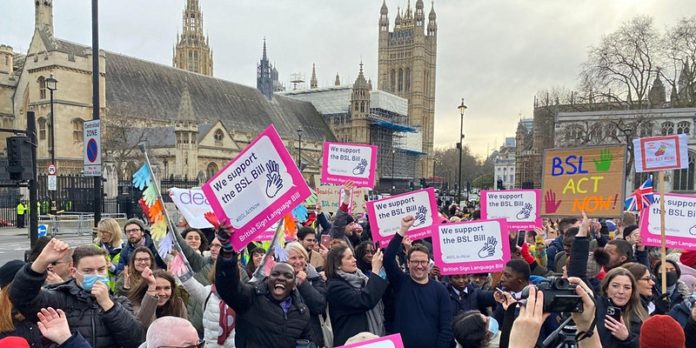The British Sign Language (BSL) Bill passed the final hurdle in the House of Commons, as thousands of Deaf people gathered to celebrate in Trafalgar Square on Friday.
The BSL Bill, which has gained cross-party support, will now progress to the House of Lords today on Monday 21 March; and be introduced by Lord Holmes of Richmond. If the Bill passes into law, a BSL Act would represent a positive step forward for the Deaf community in Britain, in terms of the recognition, facilitation and wider public awareness of their language.
A BSL Act would recognise British Sign Language as a language of England, Wales and Scotland. It would also require the Secretary of State to report on the promotion and facilitation of the use of BSL by ministerial government departments, and require guidance to be issued in relation to British Sign Language. This would set out how government departments and public bodies must meet the needs of the estimated 87,000 Deaf people in the UK; for whom BSL is a first or preferred language, as reported.
STRUGGLE TO ACCESS SERVICES
18 March is a significant date for the Deaf community, as it marks exactly 19 years since the UK government first formally recognised BSL as a language in its own right; distinct from spoken English. The government at that time promised to investigate a legal status for BSL. However, that has not happened, despite two decades of campaigning from the Deaf community. As a result, Deaf people have continued to struggle to access essential, sometimes life-saving, public services and information in British Sign Language.
“The BSL Bill presents a real opportunity for change, to finally break down avoidable communication barriers; and to give Deaf people and their language – BSL – the recognition, inclusion and equality that they deserve,” stated David Buxton, Chair of the British Deaf Association. “If the BSL Bill passes into law, we are ready to work hand-in-hand with the UK government; to redesign public services that meet the unique needs of the 151,000 people who have British Sign Language as their first or preferred language. We also hope that the legal recognition of BSL will encourage many more people across the UK to learn British Sign Language; and go on to become interpreters, bilingual professionals and allies of the Deaf community. BSL can bring us all together as a society.”
WANTED: INCLUSIVE & ACCESSIBLE SERVICES
Mark Atkinson, Chief Executive at RNID and his team are also “delighted that the British Sign Language Bill has cleared the final stage of its passage through the House of Commons”. He said he hoped it would receive “the same support from peers in the House of Lords as it has from MPs and ministers”.
He also welcomed the mechanisms within the Bill and commitment from Government to work with a proposed advisory board of Deaf people to put the Bill into practice. “Giving the Deaf community a seat at the table will mean government policies and public services will the meet the needs of Deaf people for fully inclusive and accessible services,” continued Atkinson . “We mustn’t miss the vital opportunity the Bill gives us to win legal recognition of BSL and expand Deaf people’s rights. On behalf of the Deaf community and alongside other charities, we will continue pushing to make sure the Bill is passed into law before the end of this session of Parliament.”







































